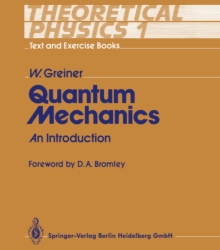Greiner Thermodynamics Statistical Mechanics Pdf
The book is basically at the level of a junior thermodynamics + statistical physics course. It's not bad, but it's mostly introductory. Microsoft lcs training. I used it more as a supplement than anything else. I would recommend Schroeder's book instead to get a nice overview of classical thermodynamics with a modest introduction to statistical mechanics. Then get a graduate text on statistical mechanics, like say Pathria or Kubo (An advanced course with problems and solutions, good book).Schroeder's book has lots of problems to work through which is good too. Greiner's book is nice because he has some worked out solutions with lots of detail, but I never used it for more than the occasional checking to see how he derived something or for an alternative explanation. I just looked through the TOC of Greiner's book and it looks pretty well organized and includes the standard topics.However, this book mainly deals with single-particle statistical mechanics, i.e.
The ensemble theory of ideal gases (of any kind). The only place where it touches upon many-particle problems is the chapter on Mayer cluster expansion, which is the classical mechanics treatment of the problem. Virial expansion is the phenomenological extension of that method for the equation of state for real gases.It is understandable, then, that the chapter on phase transitions goes as far as phenomenology can take you. However, phase transitions are in essence many-body problems (ideal gases do not exhibit phase transitions, except for, maybe Bose-Einstein condensation) and there are whole books dealing solely with these topics. I think the last chapter on Heisenberg and Ising models might give you a flavor of what's to come.But, for your level of understanding of mathematical methods and Quantum Mechanics, I would say that this book is quite suitable and will give you a good foundation.

Statistical Thermodynamics Example Problems
However, never underestimate the power of guided learning. In lack of it, perhaps you might want to consider to follow some online course resources like:Broken. Can anyone advise me about Greiner's Thermodynamics and Statistical Mecahnics? I want to master that subject and want a book that I can work through from cover to cover in detail. I can say that my command of maths, quantum mechanics and classical mechanics is at the level of Kreyszing and Boas, Griffiths and Golstein respectively.Also hoe does Greiner compare with Reif's Fundamentals of Thermal and Statistical Physics.I would be very grateful for any relevant advice.Regards,RelativistHi,Greiner's book on thermo and statistical physics is the first of the textbook i had to study when undergrad about the topic, followed by Reichl's book on statistical physics.
I want to say that both of them are really very good. The mathematics they contains is thoroughly theoretical-physics oriented. Meaning, you can understand from there most of thermo and statistical physics used in more advanced topic like, say,in cosmology and advanced general relativity. After having studied Greiner you actually can already go onto more adavnced books in other physics field because Greiner explained everything you need. Reichl is more for if you want to become a warlord in the topic itself =).

Foreword; Preface;I. Equilibrium and State Quantities; 2. The Laws of Thermodynamics; 3. Phase Transitions and Chemical Reactions; 4. Thermodynamic PotentialsII. Statistical Mechanics5. Number of Microstates and Entropy; 6.
Ensemble Theory and the Microcanonical Ensemble; 7. The Canonical Ensemble; 8.
Application of Boltzmann Statistics; 9. The Macrocanonical EnsembleIII. Quantum Statistics10. Density Operators; 11. The Symmetry Character of Many-Particle Wavefunctions; 12.
Grand Canonical Description of Ideal Quantum Systems; 13. The Ideal Bose Gas; 14. Ideal Fermi Gas; 15. Applications of Relativistic Bose and Fermi GasesIV. Real Gases and Phase Transitions16. Real Gases; 17. Classification of Phase Transitions; 18.
Thermodynamics And Statistical Mechanics Pdf
The Models of Ising and Heisenberg; Index.